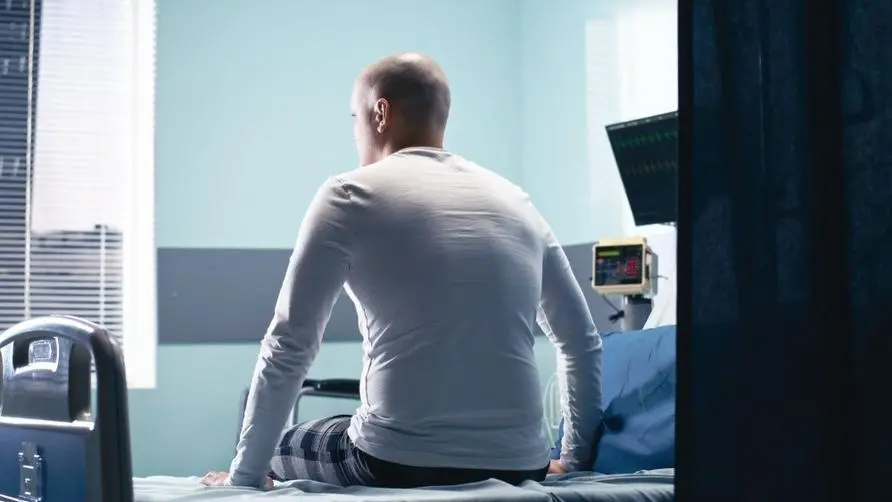Is fever, cough, and itchy skin lymphoma? Doctors reveal 6 major signs: Go to the hematology and oncology department for consultation

Have a fever and itchy skin in the evening? Pay attention to the six major signs of lymphoma
Be careful if your neck is swollen! There are more than 3,000 new cases of lymphoma every year, many of which are young patients in their 20s and 30s. Because the symptoms are not obvious, lymphoma is difficult to detect early. About half of the patients are already in stage 3-4 when diagnosed.
Dr. Li Qicheng, Secretary-General of the Blood and Marrow Transplantation Society of Taiwan, said that the main symptom of lymphoma is swollen lymph glands, especially in the groin. Some people present with fever, which is often not a high fever but a low fever. Symptoms tend to begin after the evening.
In addition, lymphoma may also grow in organs, and no obvious lymphatic enlargement can be found from the appearance. When it grows in the mediastinal cavity, it may cause the patient to wheeze and cough. It may also grow up to 10 centimeters in the abdominal cavity. Itching, night sweats, and unexplained weight loss are also common phenomena in patients with lymphoma. When the six symptoms of suspected lymphoma are found - fever, swelling, itching, sweating, coughing, and weight loss, it is recommended to seek treatment at the hematology and oncology department as soon as possible.
More than 50% of lymphomas have been newly diagnosed in ten years. This type has a poor prognosis and a high risk of recurrence.
Dr. Li Qicheng pointed out that lymphoma accounts for the tenth and eleventh among the top ten cancers in men and women. The number of new cases has increased by more than 50% in the past ten years, and it has been among the top ten in cancer mortality for many years. Malignant lymphoma can be divided into “Hodgkin’s lymphoma” (HL) and “non-Hodgkin’s lymphoma” (NHL). Among them, non-Hodgkin’s lymphoma accounts for about 92%, and according to the genetic subtype It can be divided into B-cell lymphoma, T-cell and NK-cell lymphoma, etc.
As for Hodgkin’s lymphoma, it commonly occurs in young people aged 20-35 years old and elderly people over 65 years old. The current treatment is mainly chemotherapy. Although the cure rate is high in young people, chemotherapy may accumulate toxicity to the heart and lung organs, and may cause serious complications. There is a risk of subsequent cancer. Elderly people are often unable to receive standard doses of chemotherapy, and the radical cure rate is even less ideal.
Dr. Li Qicheng explained that among the subtypes of non-Hodgkin lymphoma, those who are determined to be antigen “CD30” positive T-cell lymphoma and belong to certain genotypes often have a poor prognosis and a high risk of recurrence. It is difficult to achieve good results with current treatments, which was also a common problem faced in the treatment of lymphoma in the past.
Chemotherapy kills both good and bad, targeted treatment strikes with precision
Physician Huang Tai-chung from the Department of Internal Medicine, National Taiwan University School of Medicine, said that the first-line treatment for lymphoma includes chemotherapy, radiation therapy, bone marrow transplantation and other methods. Traditionally, chemotherapy is the main weapon. Although it can comprehensively attack cancer cells, it may accidentally kill both good and bad cells. New treatment methods include targeted therapy with monoclonal antibodies. By identifying the cell surface antigen of “CD30”, it can improve the targeting of cancer cells and reduce the impact on normal cells.
However, in the past, targeted drugs for lymphoma were mostly monoclonal antibodies or small molecule drugs used alone, lacking specific cytotoxic drugs. Nowadays, with the advancement of medical research and development, there are new antibody drugs that link monoclonal antibodies and cytotoxic drugs through linkers, which can be applied to CD30-positive lymphoma patients, including non-Hodgkin’s lymphoma T-cell lymphoma. and patients with Hodgkin’s lymphoma.
New lymphoma target drug nearly triples survival without progression
Dr. Li Qicheng explained that targeted drugs alone are less lethal to lymphoma cancer cells. By identifying CD30-positive antigens and combining them with specific cytotoxic drugs, we can carry out “precise strikes” against cancer cells to reduce damage. opportunities for innocent cells to achieve “precise anti-cancer”. Large trials also found that the progression-free survival time of the new treatment increased significantly from 23 months to 62 months, and the recurrence rate was also significantly reduced.
Dr. Li Qicheng said that the treatment of lymphoma has been dominated by chemotherapy in the past ten years. Nowadays, the combination of targeted therapy and precise cytotoxic drugs is expected to significantly increase the cure rate for suitable patients, and new targeted drugs for lymphoma have also been expanded to the first line. Health insurance benefits are expected to benefit hundreds of patients every year, allowing them to have better treatment capabilities while reducing side effects and achieving a better quality of life.
Further reading:





